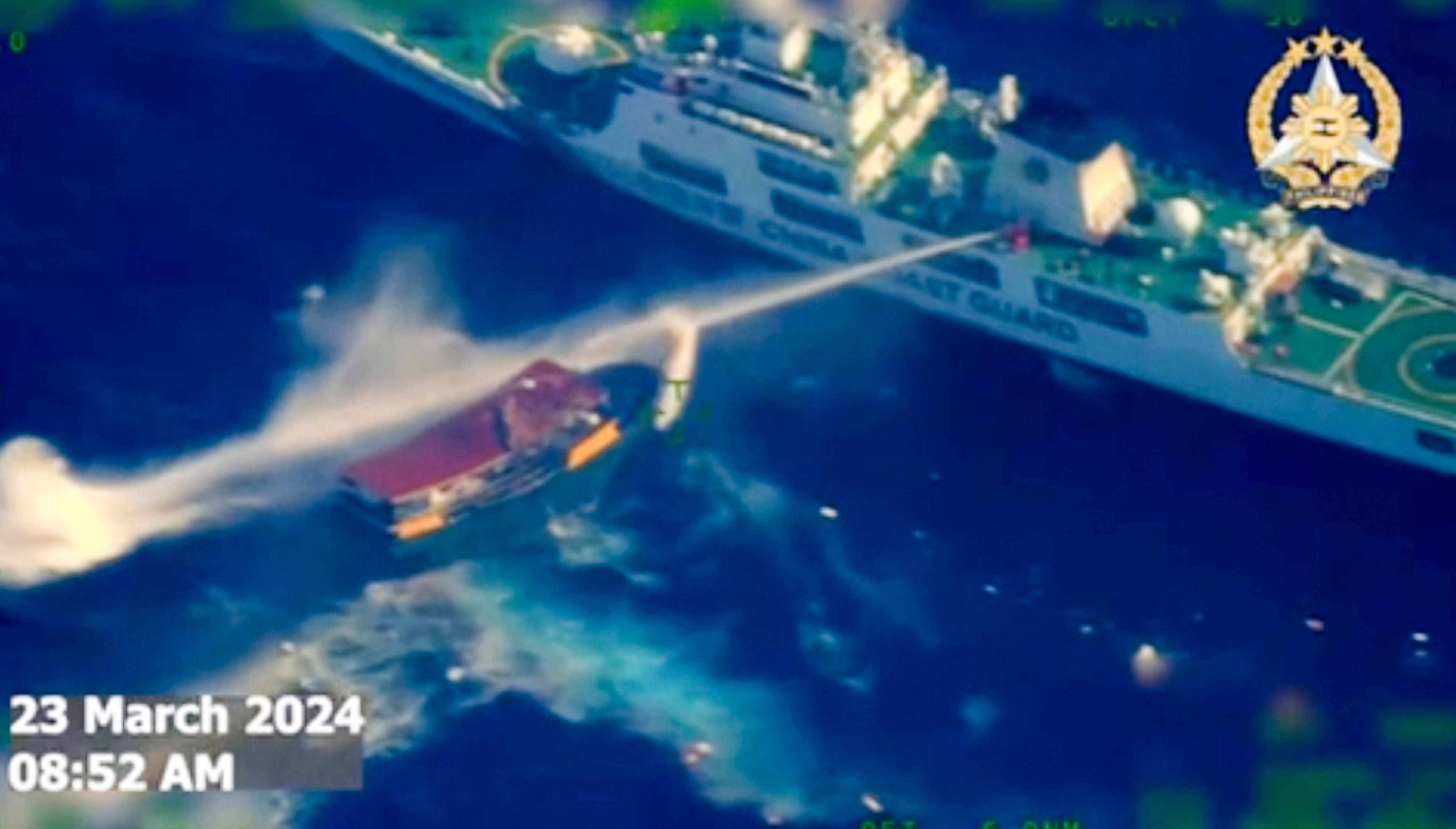Philippines lodges its `strongest protest' against China over a water cannon assault in disputed sea
The Philippines has lodged its “strongest protest” against Beijing over a water cannon assault by the Chinese coast guard that injured Filipino navy crew members and heavily damaged their boat in the disputed South China Sea

Your support helps us to tell the story
From reproductive rights to climate change to Big Tech, The Independent is on the ground when the story is developing. Whether it's investigating the financials of Elon Musk's pro-Trump PAC or producing our latest documentary, 'The A Word', which shines a light on the American women fighting for reproductive rights, we know how important it is to parse out the facts from the messaging.
At such a critical moment in US history, we need reporters on the ground. Your donation allows us to keep sending journalists to speak to both sides of the story.
The Independent is trusted by Americans across the entire political spectrum. And unlike many other quality news outlets, we choose not to lock Americans out of our reporting and analysis with paywalls. We believe quality journalism should be available to everyone, paid for by those who can afford it.
Your support makes all the difference.The Philippines lodged its “strongest protest” against Beijing on Monday and summoned a senior Chinese diplomat over a water cannon assault by the Chinese coast guard that injured Filipino navy crew members and heavily damaged their boat in the disputed South China Sea, officials said.
Two Chinese coast guard ships hit a Philippine navy-operated supply boat with water cannons Saturday in the latest and most serious confrontation between the rival Asian claimants near the disputed Second Thomas Shoal, which is surrounded by Chinese vessels in a bid to dislodge Philippine forces from there.
The repeated high-seas confrontations since last year have sparked fears of a larger conflict that could put China and the United States on a collision course.. The U.S. has warned repeatedly that it’s obligated to defend the Philippines — its oldest treaty ally in Asia — if Filipino forces, ships or aircraft come under an armed attack, including in the South China Sea.
The United States, the European Union, Japan, Australia and about 16 other countries have expressed support to the Philippines and the rule of law, according to the Department of Foreign Affairs in Manila.
China accused Philippine vessels of “intruding” into Chinese waters and its Defense Ministry warned Sunday that Beijing will continue to take “resolute and decisive measures to firmly safeguard its territorial sovereignty and maritime rights."
The Chinese Embassy in Manila issued a statement by the Chinese coast guard that warned the Philippines against “playing with fire."
Philippine Foreign Undersecretary Theresa Lazaro in a phone call with her Chinese counterpart expressed “the Philippines’ strongest protest against the aggressive actions undertaken by the China coast guard and Chinese maritime militia against the rotation and resupply mission undertaken by the Philippines,” the Department of Foreign Affairs said in a statement.
It added that it separately summoned a senior Chinese diplomat in Manila to convey the protest and demand that Chinese ships immediately leave the waters around Second Thomas Shoal, which lies in the Philippines’ exclusive economic zone, and for China to stop violating international law.
Philippine defense, security and foreign affairs officials convened a meeting Monday to discuss new steps to deal with what they say is China’s unacceptable and provocative actions in the South China Sea. Their recommendations would be submitted to President Ferdinand Marcos Jr. and were not immediately released to the public.
Second Thomas Shoal has been occupied by a small contingent of Philippine navy and marines on a marooned warship since 1999, but has been surrounded by Chinese coast guard and other vessels in an increasingly tense standoff. It’s the second time the Philippine supply boat has been damaged by water cannon in March.
The U.S. lays no claims to the busy seaway, a key global trade route, but has deployed Navy ships and fighter jets in what it calls freedom of navigation operations that have challenged China's claims to virtually the entire South China Sea. Beijing says the strengthening of U.S. alliances in Asia, including with the Philippines, is aimed at containing China and threatens regional stability.
Aside from China and the Philippines, Vietnam, Malaysia, Taiwan and Brunei also have overlapping claims in the resource-rich and busy waterway. Beijing has refused to recognize a 2016 international arbitration ruling that invalidated its expansive claims on historical grounds.